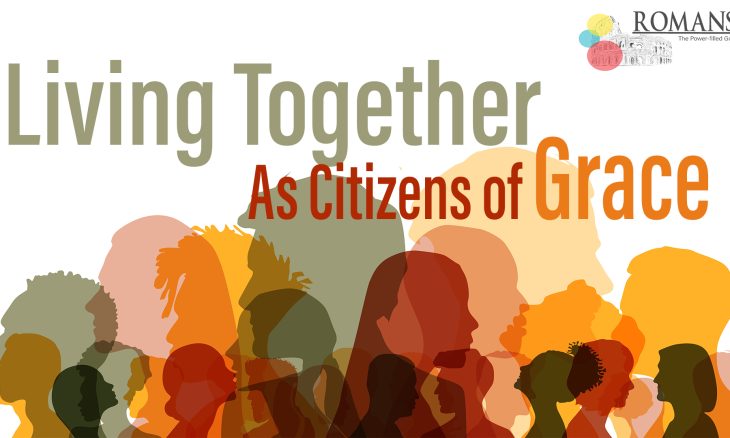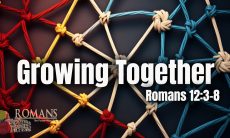Conflict in the church is nothing new. From the very beginning, believers have disagreed about worship practices, cultural traditions, and personal convictions. In Rome, it was food laws and sacred days. Today, it might be worship styles, politics, education choices, or how we spend our time and money.
Paul’s concern in Romans 14 is not that Christians never disagree, but that when we do, we handle those disagreements in a way that reflects the lordship of Christ and the love of His kingdom. The question is not: Who is right about meat or music? The question is: Will Christ still be honored, and will His people still be loved?
In this chapter, Paul gives us four anchors to hold the church together in a world of differences:
- Welcome one another, even in differences.
- Remember who the Judge is.
- Pursue peace, not stumbling blocks.
- Keep the kingdom priorities: righteousness, peace, and joy in the Holy Spirit.
These principles don’t erase our differences, but they teach us how to live in love across them — so that the church becomes a picture of Christ’s kingdom instead of a battleground of personal opinions.
I. Welcome One Another, Even in Differences
Romans 14:1–6
As for the one who is weak in faith, welcome him, but not to quarrel over opinions. 2
A. The Call to Welcome, Not Quarrel
- Paul tells the Roman church to welcome those who are weak in faith, but “not to quarrel over opinions.”
- “Weak” here refers not to their salvation but to their conscience—sensitive in certain areas of practice.
- In the first century: dietary restrictions (meat vs. vegetables), special days vs. all days alike.
- In our century: worship style, school choices, clothing preferences, political leanings, holiday traditions.
Think of family gatherings where Uncle Joe insists on his famous casserole being the only real Thanksgiving dish. Family harmony doesn’t mean everyone agrees on the menu—it means everyone is welcomed at the table.
Romans 14:2-4
One person believes he may eat anything, while the weak person eats only vegetables. 3 Let not the one who eats despise the one who abstains, and let not the one who abstains pass judgment on the one who eats, for God has welcomed him. 4 Who are you to pass judgment on the servant of another? It is before his own master[a] that he stands or falls. And he will be upheld, for the Lord is able to make him stand.
B. The Danger of Judgment
Paul warns both sides:
- “Let not the one who eats despise the one who abstains.”
- “Let not the one who abstains pass judgment on the one who eats.”
Why? Because God has welcomed him. Each believer is a servant before the Lord, not before you.
Matthew 7:1–2
“Judge not, that you be not judged. 2 For with the judgment you pronounce you will be judged, and with the measure you use it will be measured to you. 3 Why do you see the speck that is in your brother’s eye, but do not notice the log that is in your own eye? 4 Or how can you say to your brother, ‘Let me take the speck out of your eye,’ when there is the log in your own eye? 5 You hypocrite, first take the log out of your own eye, and then you will see clearly to take the speck out of your brother’s eye.
6 “Do not give dogs what is holy, and do not throw your pearls before pigs, lest they trample them underfoot and turn to attack you.
We must resist the urge to “fix” someone’s life; instead, we should present them with the truth, respectfully acknowledging that they have the responsibility to form their own convictions.
Romans 14:5-7
One person esteems one day as better than another, while another esteems all days alike. Each one should be fully convinced in his own mind.6 The one who observes the day, observes it in honor of the Lord. The one who eats, eats in honor of the Lord, since he gives thanks to God, while the one who abstains, abstains in honor of the Lord and gives thanks to God.
C. The Heart of the Matter: Honor the Lord
Whether it’s eating or abstaining, observing a day or treating all days alike—the key issue is motivation.
- Each believer should be “fully convinced in his own mind” and act with a clear conscience before God.
- The common thread: gratitude and honor to the Lord.
Picture two people in church: one raises hands in worship, the other folds hands quietly. Both can be honoring the Lord—if their posture comes from love and thankfulness, not comparison.
Living this out:
- Hold firmly to convictions where Scripture is clear (the gospel, morality, holiness).
- Show grace where Scripture allows freedom (music, diet, traditions, politics).
- Welcome, brothers and sisters, as God has welcomed us in Christ, recognizing that we, like them, are a work in progress, learning and growing to become more like the author of our faith, Jesus Christ.
In disputable matters, unity is not uniformity but charity.
The Early Church
Acts 15 — The Jerusalem Council: Jewish and Gentile believers disagreed on circumcision, food laws, and customs.
- The apostles did not demand uniformity but sought unity in the gospel.
- They urged Gentiles to avoid practices offensive to Jews (charity),
- while affirming that salvation was through Christ (unity in essentials)
“In essentials, unity; in non-essentials, liberty; in all things, charity.”
This spirit reflects the early Christian struggle for balance.
II. Remember Who the Judge Is
Romans 14:7-9
For none of us lives to himself, and none of us dies to himself. 8 For if we live, we live to the Lord, and if we die, we die to the Lord. So then, whether we live or whether we die, we are the Lord’s. 9 For to this end Christ died and lived again, that he might be Lord both of the dead and of the living.
A. Our Lives Belong to the Lord (vv. 7–9)
Paul reminds us that none of us “lives to himself” or “dies to himself.” We are not independent contractors—we are owned by Christ.
- Whether in life or in death, we belong to Him.
- This truth steadies us in times of difference: my brother or sister is not “mine” to evaluate, but Christ’s servant to honor.
- Christ purchased us by His death and resurrection so that He might be Lord of all (v. 9).
Think of two kids squabbling over who “gets” the ball at recess. The teacher finally steps in and says, “It’s mine—I brought it.” Ownership settles the argument. Likewise, remembering that we belong to Christ settles many disputes.
Paul presses the point: Why do you pass judgment? Why do you despise your brother?
Romans 14:10–12
10 Why do you pass judgment on your brother? Or you, why do you despise your brother? For we will all stand before the judgment seat of God; 11 for it is written,
“As I live, says the Lord, every knee shall bow to me,
and every tongue shall confess[a] to God.”
12 So then each of us will give an account of himself to God.
B. Judgment Belongs to God Alone (vv. 10–12)
The reason this is so serious is that judgment is God’s job, not ours. “For we will all stand before the judgment seat of God.”
2 Corinthians 5:10 — “For we must all appear before the judgment seat of Christ.”
James 4:12 — “There is only one lawgiver and judge, he who is able to save and to destroy.”
Every believer will give an account directly to the Lord (v. 12). That should humble us before we start grading someone else’s test.
Illustration: Imagine a classroom where students are told to focus on their own assignments. But instead, they start crossing the room to mark each other’s papers. The teacher steps in and says, “I will do the grading.” That’s Paul’s point—don’t try to sit in God’s chair.
Living this out:
Before trying to correct a fellow believer, pause and ask yourself: “ am I trying to help them see the correct answer in love or Am I trying to sit in God’s chair?”
- Instead of wasting energy measuring others, invest that energy in living faithfully yourself because it’s at point that you actually have something valuable to share that will assist your fellow brothers and sisters in pursuing the path that God calls us to follow.
Remember Jesus teaches in Matthew 7:3–5 to remove the log from your own eye before worrying about someone else’s speck.
- The sobering reality: one day you won’t give account for your neighbor’s quirks, but for your own obedience, faith, and love.
Paul deals strongly with this topic because it is potentially extremely offensive to God!
- Imagine courtroom scene. Imagine a defendant trying to leap over the bench to take the judge’s gavel.
- It would be laughable, even offensive.
- That’s what we do when we take judgment into our own hands in disputable matters.
We are not the judges of one another—Christ is. Our task is to live faithfully under His lordship, remembering that He alone sees the whole picture, He alone has the authority, and He alone will render the final verdict.
I’ve been reading through some of the life of Corrie ten Boom:
After World War II, Corrie ten Boom traveled teaching forgiveness. One night, after she spoke, a man approached her — one of the guards from Ravensbrück concentration camp where her sister Betsie had died. He reached out his hand, asking forgiveness.
Corrie admitted in her testimony that she didn’t want to forgive him — but she remembered that Christ was Judge, not her. In obedience, she extended her hand, and she said in that moment she felt the love of Christ flow through her.
Romans 14:13-16
Therefore let us not pass judgment on one another any longer, but rather decide never to put a stumbling block or hindrance in the way of a brother. 14 I know and am persuaded in the Lord Jesus that nothing is unclean in itself, but it is unclean for anyone who thinks it unclean. 15 For if your brother is grieved by what you eat, you are no longer walking in love. By what you eat, do not destroy the one for whom Christ died. 16 So do not let what you regard as good be spoken of as evil.
III. Pursue Peace, Not Stumbling Blocks
A. A New Decision: Build Up, Don’t Tear Down (v. 13)
Paul shifts from warning against judgment to a positive command: “Decide never to put a stumbling block or hindrance in the way of a brother.”
- Stumbling block = anything that causes another believer to fall into sin, confusion, or discouragement.
The point is my choices may be “lawful,” but if they trip up a weaker believer, I’m failing in love.
Imagine hiking with a group and purposely leaving rocks on the path that cause someone to trip. Even if you’re strong enough to handle the terrain, you still made the path harder for someone else.
B. Love Limits Liberty (vv. 14–16, 20–21)
Vs 20-21
Do not, for the sake of food, destroy the work of God. Everything is indeed clean, but it is wrong for anyone to make another stumble by what he eats. 21 It is good not to eat meat or drink wine or do anything that causes your brother to stumble.
Paul is clear: “Nothing is unclean in itself” (v. 14). In Christ, food and drink are not inherently sinful.
- But he adds: if a brother thinks it’s unclean, then for him it is. His conscience matters.
- “By what you eat, do not destroy the one for whom Christ died” (v. 15).
This is strong language — our freedom should never come at the expense of Christ’s blood-bought people.
1 Corinthians 8:9
Take care that this right of yours does not somehow become a stumbling block to the weak.”
Galatians 5:13
“For you were called to freedom, brothers. Only do not use your freedom as an opportunity for the flesh, but through love serve one another.
Think about driving with high-beam headlights: they help you, but they blind someone coming the other way. Out of love, you dim the lights.
Romans 14:17-19
17 For the kingdom of God is not a matter of eating and drinking but of righteousness and peace and joy in the Holy Spirit. 18 Whoever thus serves Christ is acceptable to God and approved by men. 19 So then let us pursue what makes for peace and for mutual upbuilding.
IV. The Kingdom Priority: Righteousness, Peace, and Joy
A. The Kingdom Is Bigger Than Food and Drink (v. 17)
Paul cuts through the noise: “The kingdom of God is not a matter of eating and drinking…”
In other words, God’s kingdom is not centered on us, but on something far bigger than us!
Jesus Himself said, “Seek first the kingdom of God and His righteousness, and all these things will be added to you” (Matthew 6:33).
- Food and drink are temporary; righteousness, peace, and joy in the Holy Spirit are eternal.
Think of a child who obsesses over the wrapping paper on a gift while ignoring the treasure inside. Arguments over “wrapping paper” miss the real gift of life in God’s Spirit.
B. The Marks of True Kingdom Life
- Righteousness — living in right relationship with God and with others. This echoes Micah 6:8: “Do justice, love kindness, walk humbly with your God.”
- Peace — not simply the absence of conflict, but the presence of wholeness, harmony, and reconciliation among God’s people.
- Joy in the Holy Spirit — a settled gladness rooted in God’s presence, not in circumstances (Philippians 4:4).
Paul says that whoever serves Christ this way is “acceptable to God and approved by men.” That means when righteousness, peace, and joy are evident, both God and people recognize the authenticity of our faith.
A church that models righteousness, peace, and joy looks alive and inviting — like a home filled with laughter and light.
C. The Call to Pursue Peace and Mutual Upbuilding (v. 19)
Paul ends with an action step: “So then let us pursue what makes for peace and for mutual upbuilding.”
- Pursue = chase after. Peace and encouragement don’t just “happen” — we must actively seek them.
- “Mutual upbuilding” means strengthening one another’s faith instead of weakening it.
True citizenship in God’s kingdom means living so that others taste His peace and joy through us.
Illustration: A family photo album is meant to capture smiles, milestones, and love — not bitter arguments. God’s family portrait should reflect joy and peace, not division and strife.
- Personally: Ask yourself, “Am I more focused on winning arguments or building up Christ’s body?”
- Relationally: When tension arises, make your first question: “Must truth be defended here? And secondly, will this promote peace or fracture it?”
Conclusion:
Romans 14 calls us to lift our eyes higher. The Christian life is not about winning arguments, proving points, or pushing personal preferences. It’s about honoring Christ, loving one another, and reflecting the values of His kingdom.
- Welcome one another — because God has welcomed us in Christ.
- Remember who the Judge is — because one day each of us will stand before Him, not before each other.
- Pursue peace, not stumbling blocks — because love limits liberty for the sake of others.
- Keep the kingdom priority — because the kingdom is about righteousness, peace, and joy in the Holy Spirit, not food, drink, or disputable matters.
When we live this way, the church shines as a family that looks like its Father: gracious, truthful, and full of joy. A family photo album doesn’t need to capture perfection — it should capture love, peace, and gladness in Christ. That’s the kind of picture the world longs to see.
So let’s ask ourselves: Am I more concerned with being right, or with building up the body of Christ? Am I chasing arguments, or am I pursuing peace? Because at the end of the day, our unity is not in uniformity — it’s in the Lord who has welcomed us all.
Citizens of Grace in a Divided World
- Paul doesn’t tell us to agree on every issue—he tells us to love each other despite differences.
- In Christ, we’re not judges—we’re brothers and sisters.
- Let us live as citizens of grace: welcoming, patient, peace-seeking, Christ-centered.
Closing Application:
- Who in your life do you need to stop judging?
- Where might God be calling you to give up a “right” for the sake of love?
- How can you show peace and joy in your home, workplace, or school this week?















